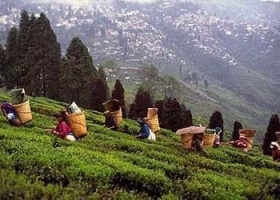Tensions with Pakistan, Devalued Pound Hurt India Tea Exports
Rising tensions with Pakistan, as well as a devalued pound and lower black tea consumption in the U.K., are hurting India’s tea exports for 2016, reports The Times of India.
Lower demand from the global markets has already pulled down the price of good-quality tea by 8 to 10 percent compared with this time last year, The Economic Times reported. In 2015, India shipped out 233 million kg of tea.
Tea exports to Pakistan fell 36 percent to 7.46 million kg for the period January–August 2016, according to The Times of India. Tensions between the two nations have risen after India’s strike in Pakistan Occupied Kashmir and tea is not being shipped through the Wagah border between India and Pakistan.
“Merchant exporters have started shipping tea to Dubai wholesale merchants. From there, tea is being shipped to Pakistan, enormously increasing costs at the retail consumer end,” a member of the Tea Board of India told the publication.

Indian tea garden.
Growers and traders also are concerned about the consequences of Britain’s decision to leave the European Union, according to The Economic Times. In the first eight months of 2016, exports to the U.K. dropped 12.64 percent from a year earlier.
“The pound devaluation has hurt the Indian tea industry the most. Moreover, black tea consumption is dwindling in the U.K. According to their own estimates, it has fallen by 15 percent since 2010 as Britons are embracing green tea and coffee,” said Azam Monem, a director at McLeod Russel India, one of the biggest tea growers.
(Source: Worldteanews.com)

BÀI VIẾT LIÊN QUAN
Drought in Kenya is threatening the Tea Production.
Battling Cancer with Tea
Ready-to-drink Beverages increase steadily over $100 billion
India Tea Export is hurt by tensions with Pakistan and devalued Pound
Vietnam’s Tea Export Prices Half of World’s Average
Kenya: Tea Exports Down As Pakistani Sales Drop
Trade volumes up 17.7 per cent, highest in five months – KNBS
Kenyan tea glut pushes prices to multi-year lows, trade body says